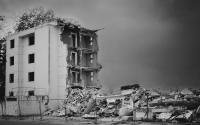Common Dreams / Published on Tuesday, March 30, 2004 by the New York Times
Last week an opinion piece in the Israeli newspaper Haaretz about the killing of Sheik Ahmed Yassin said, "This isn't America; the government did not invent intelligence material nor exaggerate the description of the threat to justify their attack."
So even in Israel, George Bush's America has become a byword for deception and abuse of power. And the administration's reaction to Richard Clarke's "Against All Enemies" provides more evidence of something rotten in the state of our government.
The truth is that among experts, what Mr. Clarke says about Mr. Bush's terrorism policy isn't controversial. The facts that terrorism was placed on the back burner before 9/11 and that Mr. Bush blamed Iraq despite the lack of evidence are confirmed by many sources — including "Bush at War," by Bob Woodward.
And new evidence keeps emerging for Mr. Clarke's main charge, that the Iraq obsession undermined the pursuit of Al Qaeda. From yesterday's USA Today: "In 2002, troops from the Fifth Special Forces Group who specialize in the Middle East were pulled out of the hunt for Osama bin Laden to prepare for their next assignment: Iraq. Their replacements were troops with expertise in Spanish cultures."
That's why the administration responded to Mr. Clarke the way it responds to anyone who reveals inconvenient facts: with a campaign of character assassination.
Some journalists seem, finally, to have caught on. Last week an Associated Press news analysis noted that such personal attacks were "standard operating procedure" for this administration and cited "a behind-the-scenes campaign to discredit Richard Foster," the Medicare actuary who revealed how the administration had deceived Congress about the cost of its prescription drug bill.
But other journalists apparently remain ready to be used. On CNN, Wolf Blitzer told his viewers that unnamed officials were saying that Mr. Clarke "wants to make a few bucks, and that [in] his own personal life, they're also suggesting that there are some weird aspects in his life as well."
This administration's reliance on smear tactics is unprecedented in modern U.S. politics — even compared with Nixon's. Even more disturbing is its readiness to abuse power — to use its control of the government to intimidate potential critics.
To be fair, Senator Bill Frist's suggestion that Mr. Clarke might be charged with perjury may have been his own idea. But his move reminded everyone of the White House's reaction to revelations by the former Treasury Secretary Paul O'Neill: an immediate investigation into whether he had revealed classified information. The alacrity with which this investigation was opened was, of course, in sharp contrast with the administration's evident lack of interest in finding out who leaked the identity of the C.I.A. operative Valerie Plame to Bob Novak.
And there are many other cases of apparent abuse of power by the administration and its Congressional allies. A few examples: according to The Hill, Republican lawmakers threatened to cut off funds for the General Accounting Office unless it dropped its lawsuit against Dick Cheney. The Washington Post says Representative Michael Oxley told lobbyists that "a Congressional probe might ease if it replaced its Democratic lobbyist with a Republican." Tom DeLay used the Homeland Security Department to track down Democrats trying to prevent redistricting in Texas. And Medicare is spending millions of dollars on misleading ads for the new drug benefit — ads that look like news reports and also serve as commercials for the Bush campaign.
On the terrorism front, here's one story that deserves special mention. One of the few successful post-9/11 terror prosecutions — a case in Detroit — seems to be unraveling. The government withheld information from the defense, and witnesses unfavorable to the prosecution were deported (by accident, the government says). After the former lead prosecutor complained about the Justice Department's handling of the case, he suddenly found himself facing an internal investigation — and someone leaked the fact that he was under investigation to the press.
Where will it end? In his new book, "Worse Than Watergate," John Dean, of Watergate fame, says, "I've been watching all the elements fall into place for two possible political catastrophes, one that will take the air out of the Bush-Cheney balloon and the other, far more disquieting, that will take the air out of democracy."






